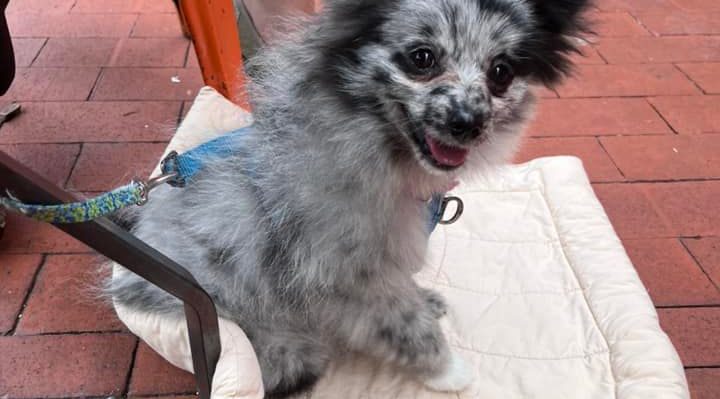
What is a foster fail? Ray Chao, writing for Pets Best, explains: “A ‘foster failure’ is the lighthearted affectionate term used to describe when a foster pet parent permanently adopts the dog or cat. So, while it is technically a ‘failure’ because pet foster placements are meant to be temporary; it is also a ‘success’ because the pet has found a loving, safe forever home.”
The primary goal of pet fostering is to provide a temporary foster home for a pet in need until a permanent home can be identified. Pet foster placements are a vital part of pet advocacy because many shelters have limited resources, and foster homes allow shelters to house more animals. Also, most cats and dogs will be happier in a home than a shelter, which makes them more likely to be adopted, particularly if the pet has special needs and requires more attention than a shelter can provide.
Because pet fostering is designed to be temporary, some foster parents choose to foster over adoption because there may be reasons why a permanent commitment is not possible. Even if only temporary, fostering can be tremendously rewarding due to the unique satisfaction of helping a pet find a forever home.
Potential pet foster parents, however, should realize that the goal of fostering is not the same as adoption even though fostering a pet is equally important.
—Avoiding Foster Fail and Successfully Foster a Pet | Pets Best
I asked friends online to “Tell us about your foster failure!” I added: “Any animal, any time—if you had a foster fail (a fostered animal you decided to keep), we want to hear about it. The whole story, please!” Here are some of their touching tales.
Summer Storm Kingery DVM (North Carolina) I lost four dogs, all very senior, 16–18 years old, in two years. This critter came across my feed and looked so happy and bright and young and, even better, nothing like my other dogs. I contacted the rescue to help out, while I looked for my next dog. I thought I wanted something small … a lap dog. That was what I was missing most about my most recent loss. Instead, this thing is a powerhouse dynamo. Large, in charge, endless energy, incredibly interactive, opinionated, and intolerant of any level of being ignored. Consequently, she brought me back into dog training, which is helping me with professional burnout.
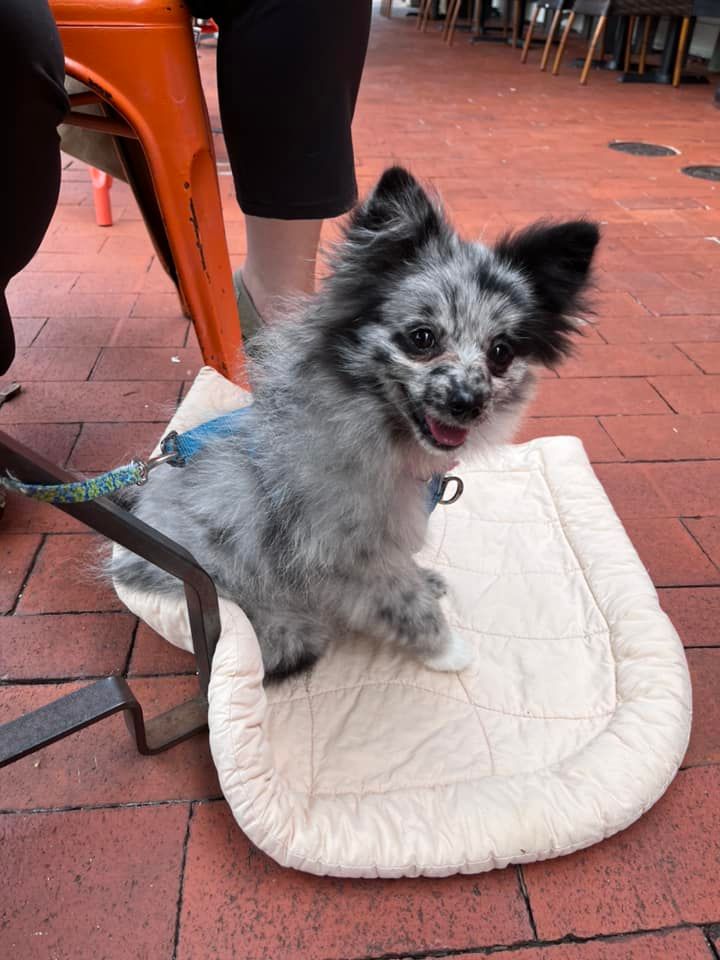
Photo by Summer Storm Kingery
Jessica Stinson Hudson (Alabama) Technically, I’ve had one (a foster fail). We found a litter of puppies born just after Hurricane Katrina, with a rescue in Louisiana. We live in Alabama and applied, were approved, and began discussions about the right fit. Came down to a male and female. We decided on the male and brought him home at age nine weeks. I continued to keep up with the rest of the litter and none of them were getting adopted. So when they were five months old, we offered to foster the female we liked. The second I met her, I realized she was greatly under-socialized. Within a month, I knew there was no way anyone would adopt her.
We kept her. For 14 years, our lives were limited because of her. She was incredibly fearful. Never trusted any of us fully. She was content and happy at home but reserved and a “don’t touch me” type. Terrified of new people. Her best quality was being exceptionally skilled with other dogs and puppies. I guess since her early life, she had been confined with her mom and eight sisters— she learned how to dog well. We loved her as much as we could but, to be honest, she was the most frustrating dog, with no bounce-back. She lived a long, good life, limited to where she was comfortable and safe.
The rest of the litter (except for her brother that I got early and another puppy who was adopted at nine weeks) were euthanized for fear biting. They all were ruined by the rescue who tried to save them all but didn’t know how.
Sarah Richardson (California) Rudy was in one of the animal emergency shelters after the Camp Fire, the horrible fire that obliterated the town of Paradise, California, on November 8, 2018. Despite all the stress of the situation, there he was, greeting me with a wagging tail and the softest eyes when I arrived to volunteer. He was never claimed. Based on the obvious neglect he had experienced prior to the fire—which created much more persistent medical problems than the burns from the fire—it seemed that it was Rudy’s good fortune that no one ever came for him and that he stole my heart. Eventually, the unclaimed dogs were released for fostering and adoption and I took Rudy in as a foster. Once he was in my home, I discovered he didn’t just have medical problems. He also had separation anxiety—and many other behavior challenges, too. As I worked on getting him healthy, physically and behaviorally, it became clear that Rudy wasn’t going anywhere.
He stole my heart and my couch!
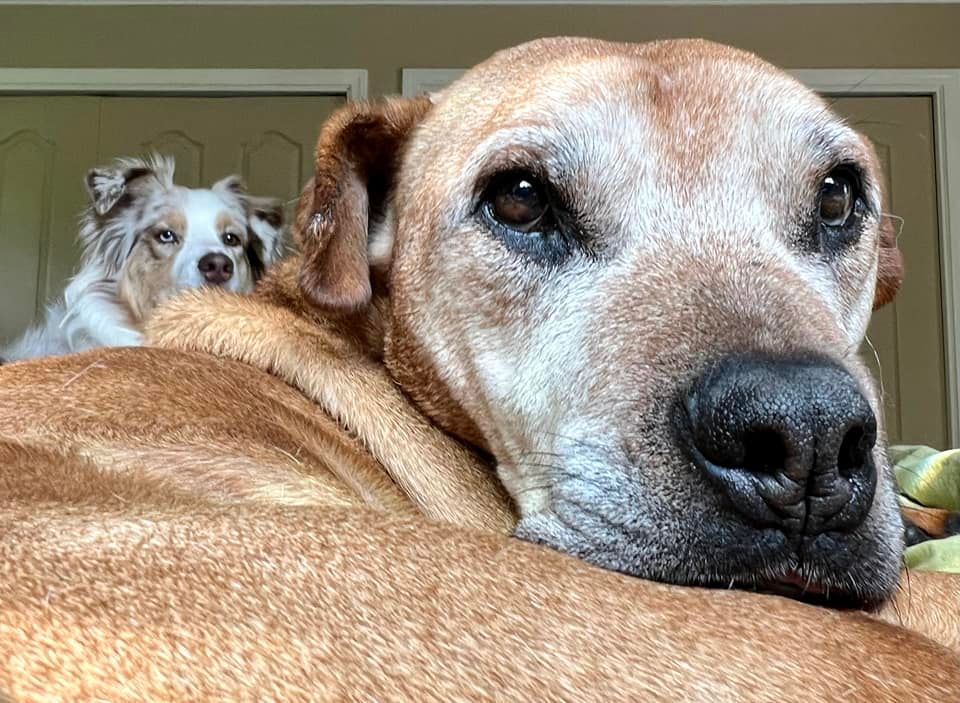
Photo by Sarah Richardson
Cathy Collins (Michigan) My first foster failure (and only one to date) was a 15-year-old black miniature Schnauzer (Griffin) that had been dumped by his owner who apparently believed the dog was at death’s door. The man’s wife had passed of cancer the previous year. Griffin had been his wife’s dog. The man now had a new girlfriend and they had moved in together with their blended families. Griffin did not fit in with their new lives. The man had contacted animal control to dump Griffin, and animal control contacted the local rescue that I volunteer with. I cried when I witnessed the man nonchalantly and unceremoniously dump Griffin with all his belongings at the pet store where our rescue conducts our meet-and-greets. It was heartbreaking!
How could anyone do this to their senior dog?
Griffin only had one eye and his good one was impaired. His hearing wasn’t the best either. And he could no longer do stairs. I fostered him (my first) and immediately fell in love with him.
I soon got him out running around the yard. I’d get ahead of him and he’d see me and start running after me. When he lost sight of me, he’d stop and look around and I’d call his name and he’d start running toward me again. I felt as though I’d breathed life back into this lifeless senior dog. It was the best feeling in the world.
Six weeks later he was adopted out to an elderly woman who lived two hours away.
I cried when she came and picked him up and cried every day thereafter. After a few days, his new mom called me with questions. I asked if I could come visit and she said, “Of course.” I drove the two hours about a week later and visited for several hours. I gave Griffin a bath and actually got him up and running around her small yard. She was amazed how he came to life with me. All Griffin had done since she’d adopted him is to lie on the floor and nap. I said my goodbyes and cried the two hours home. Why had I not kept him?
After I got home, his new mom called to make sure I’d made it home okay. I was bordering on asking her if she could see it in her heart to return him when she said to me, “Griffin needs to be with you. You two have a special bond. I can see it.” A week later, she drove the two hours to bring him back to me.
From the time since his rescue, Griffin lived 17 months and it was the best 17 months of my life. My little man taught me so much, especially about myself. All my friends had known that I should have kept him in the first place. Everyone said they could tell we were meant to be together from day one. It was the way I lit up when I talked about my foster Griffin. I just failed to acknowledge it myself.
I have fostered several dogs since Griffin, but have never felt the sadness I did when Griffin was adopted out. But it all worked out in the end. And I became close friends with the elderly woman who had initially adopted him. We talk on a regular basis and I have visited her several times, bringing along my three dogs.
Micha Michlewicz (Maryland) Angel (now 15) was a breeder in a puppy mill that was closed down for cruelty. At age four, she ended up in a rescue of the groomer I was working for at the time. I worked with a lot of the rescue dogs as we tried to find them homes, but Angel was taking quite a while. She was very traumatized and incompatible for most homes due to extreme fear and anxiety, house soiling, and other puppy-mill brood-dog issues. Eventually I found her a home, but she escaped and the adopter didn’t want her back due to no bonding and all the other issues.
Again, we looked for a new home, but once people heard about her issues in my painful honesty to have them be fully informed, no one wanted her despite her adorableness that drew them in. After about a year, I couldn’t let her go any more and stopped looking. By this time, she had made great strides and was affectionate, responsive to training, and having a good quality of life.
Dogs like this can have a very low quality of life in inexperienced homes.
Picture is of her standing on the table, playing her favorite game, Search! (for treats).
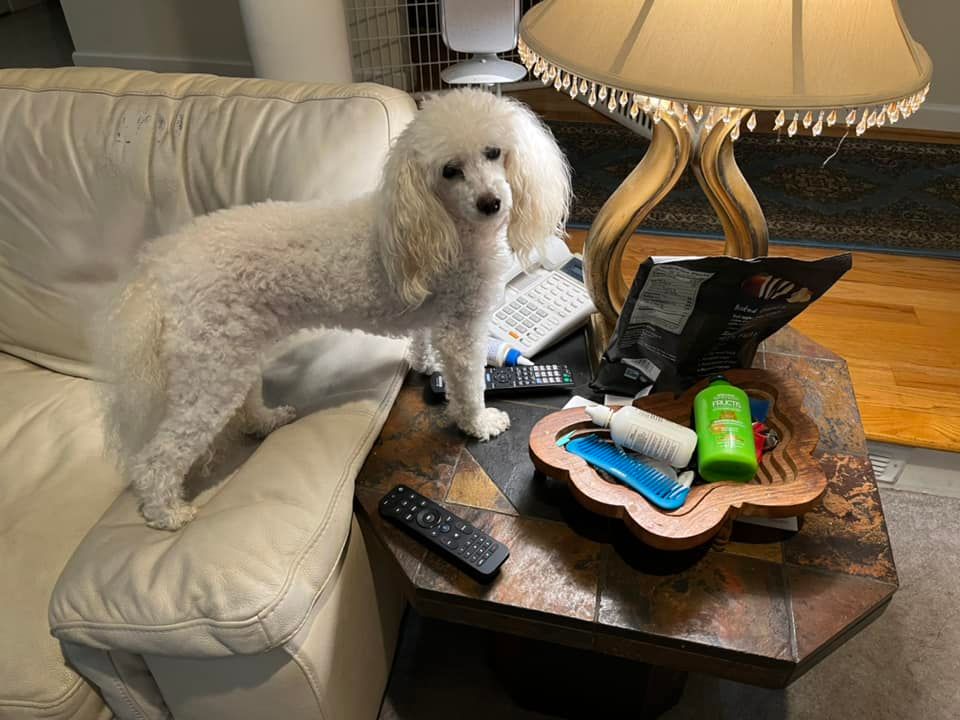
Photo by Micha Michlewicz
Deb Hunt (Washington) I have been in rescue my entire life. I received a phone call from a local restaurant requesting assistance with a scared puppy that appeared to be lost and seeking shelter inside every time a customer entered. I grabbed a leash and went to retrieve the puppy.
I was told employees had the puppy at the back door, so I approached, eager to see. Our eyes met and my heart started melting. A beautiful ginger mix, with expressive big brown eyes. It was love at first sight. Driving home with him, I could feel the kismet energy brewing, and when we arrived at my house, no leash required, he was right on my heels.
He quickly picked up and paraded around the premises with my Stanley screwdrivers, so it became obvious his name would be Stanley. I ran advertisements, put up flyers, made a Lost & Found post, door-knocked in the neighborhood near the restaurant, left info with animal control, but I wasn’t successful in locating an owner.
After 30 days, you can place a found pet, but in that 30 days, Stanley was quick to learn the basic training and we were bonding. He demonstrated other talents and every lesson he eagerly embraced. Then he started breath-testing me in the morning. I am diabetic, so I was thrilled with this discovery. Then one day an incident happened where he started licking me, braced my front with his body, and I could feel myself sliding into an altered state. My friend picked up on Stanley’s cue and got me some juice while I steadied myself.
For 12 wonderful years, he was Stan The Man, alerting me to blood-sugar problems and protecting our home. I felt blessed and grateful that nobody claimed him, and that I wasn’t able to place him.
Kimberly Hall (Massachusetts) My seventh foster was my only failure—16 months old, 35 pounds—he came to me as a foster after being in a southern rescue for eight months already. He was hyper, shy, a barker, badly mannered, not house trained, and the perfect dog for me. He was sweet, great with other dogs, good with my cat, high energy, fast, athletic, and a snuggler.
His name was Jumpin’ Jack for his tendency to leap straight into the air when he wasn’t zooming around the yard or digging holes everywhere. He’s a growly, dog but it’s how he invites play—dogs can tell but humans back away. He’ll leap into my lap and growl at me, from there the tail starts going super fast and he starts barking and into play pose when I dump him off me laughing at him.
Clearly, someone had tried to house-train him by sticking his nose in the mess and hitting him with something. If I showed him a toy, he would run and hide. If I moved an arm too quickly near him, he would duck and hide.
When he barks, he puts his whole body into it, lifting his front feet off the ground. He’s now eleven and still an athlete, still puts everything into everything he does. He’s been an exceptional agility dog. It took him a bit but he won over my other dog who wanted to kill any dog in her house. Once she accepted him it was 100%.
I’ve had to get used to the idea that if he’s busy doing important doggie stuff when I call him, he’ll get back to me later, which has taught me to see the world from his perspective.
He’s probably not the right dog for most people, but he’s so much fun.
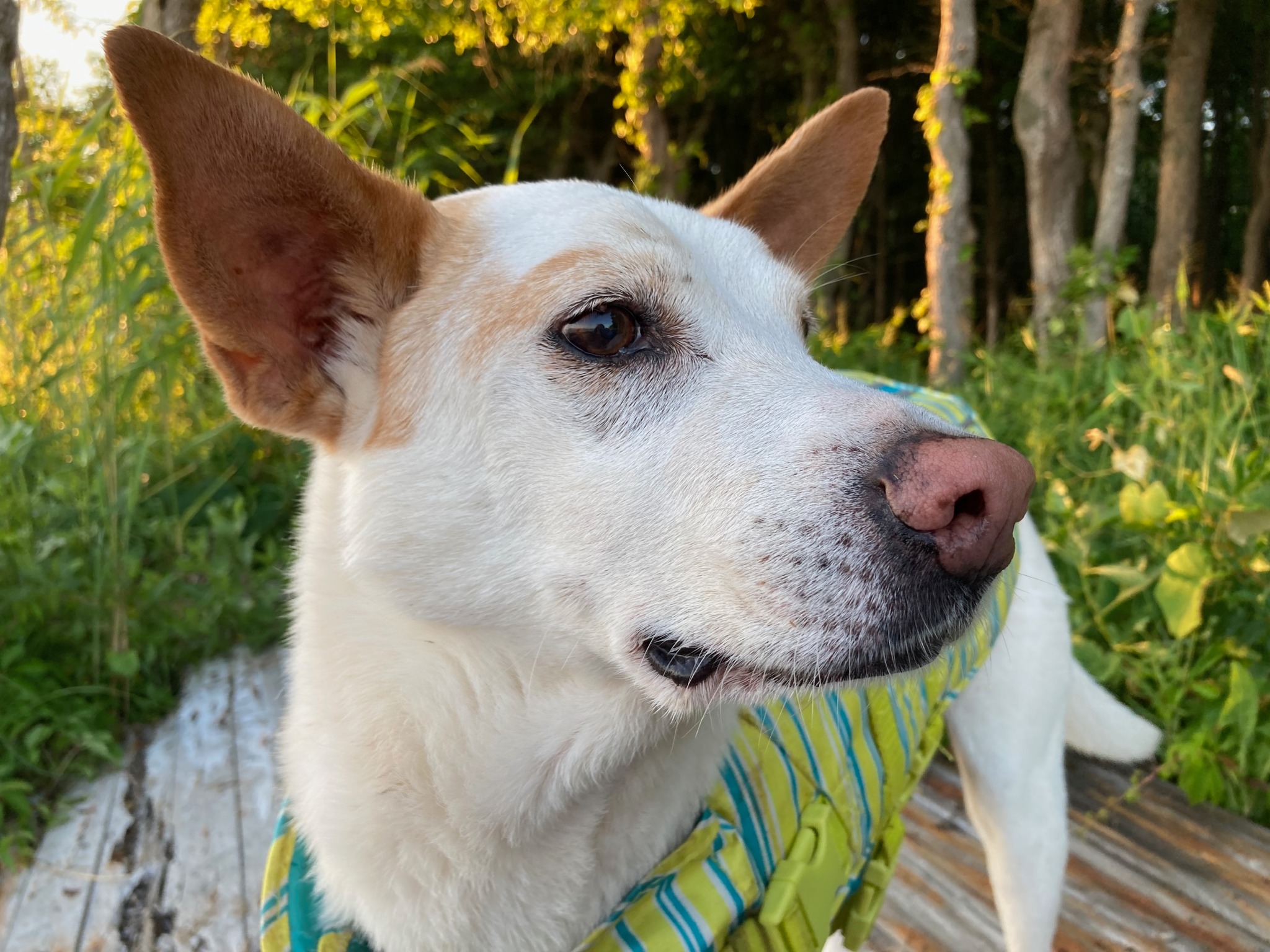
Photo by Kimberly Hall



